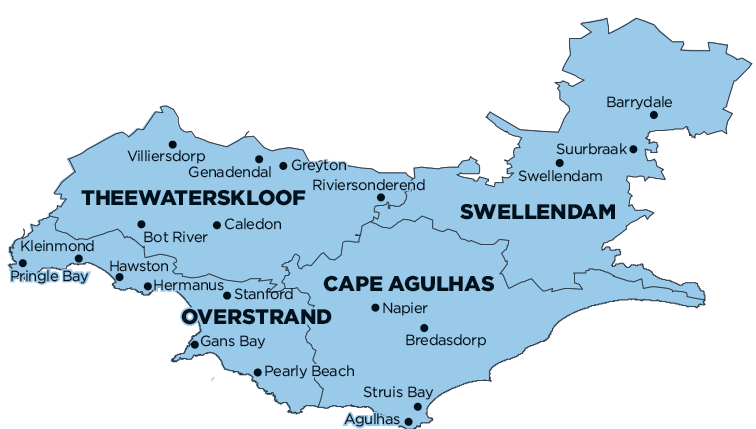
Geography, History & Economy
Cape Agulhas Local Municipality is part of Overberg District Municipality.
MDB code: WC033
Description: The Cape Agulhas Local Municipality is a Category B municipality situated within the Overberg District in the Western Cape Province. It is one of four municipalities in the district, making up a third of its geographical area. A large percentage of the population falls within the economically active population (aged 15-65), but the unemployment rate in Cape Agulhas is still relatively high.
Though regarded as one of the best-performing local governments when it comes to housing delivery, the housing backlogs remain a challenge. The municipality strives to improve basic services with limited resources, however, the upgrading and maintenance of basic services remain a challenge. Strategic partnerships have become increasingly important, as illustrated by council’s high expenditure on MIG projects and active participation in EPWP projects.
Environmental issues have become an important factor for the municipality to consider, especially with the effects of global warming and climate change. The municipality is endeavouring to integrate the effects and consequences of global warming and climate change into the general planning of service delivery, as can be seen in the municipality’s awarding of a waste to energy bioproject to Ark Industries.
The municipality has created adequate capacity to deliver in critical departments such as economic development, human settlements and human development. Good governance has always been a priority for the council and the establishment of a Risk Management Unit, an Internal Audit Unit, a Municipal Public Accounts Committee, as well as more than 13 years of unqualified audit reports, is a testimony to this.
Area: 3 471km²
Cities/Towns: Agulhas, Arniston, Bredasdorp, Elim, Klipdale, Napier, Protem, Struis Bay, Suiderstrand
Main Economic Sectors: Finance, insurance, real estate and business services (26%), general government (19.1%), manufacturing (17%), wholesale and retail trade, catering and accommodation (9.8%), construction (9.6%), agriculture, forestry and fishing (7%), community, social and personal services (5.6%), transport, storage and communication (4.1%)
